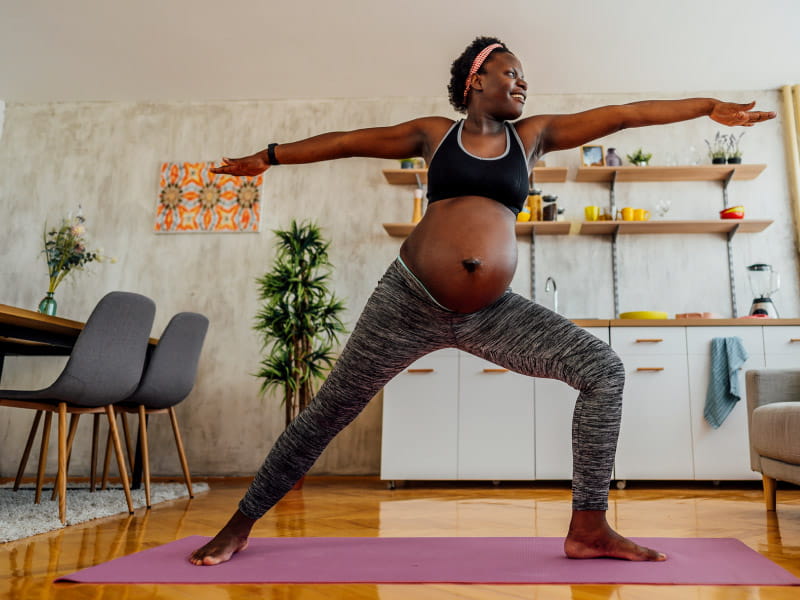Prenatal yoga may help ease stress, improve fitness during pregnancy
By Laura Williamson, American Heart Association News

Butterfly. Cat. Pointer dog. More than pretty critters, these are yoga poses experts say could be part of a healthy pregnancy.
Though moving a growing belly through a series of poses might seem like the last thing a pregnant woman would want to do, health experts say it's high on the list of activities that could help ease her through the body-altering experience of creating a new life.
"Yoga can be adapted to a lot of health states," said Dr. Erin Michos, director of women's cardiovascular health research and an associate professor of medicine at Johns Hopkins University School of Medicine in Baltimore. "There are modifications that can be done to adapt to the physical constraints of pregnancy."
Federal physical activity guidelines recommend pregnant and postpartum women get at least 150 minutes of moderate-intensity physical activity per week, in line with guidelines for all adults.
Michos, who co-authored a 2021 American Heart Association report on the connection between physical and mental health, said yoga could give pregnant women a lot of bang for their exercise buck because it provides both physical and mental health benefits. It is generally safe during pregnancy if the woman is healthy and having a healthy pregnancy, she said.
"It is a low-impact activity that a lot of people can do," Michos said.
Yoga has been shown to lower stress and anxiety, which can contribute to complications such as premature births and low birthweight. It may also help lower blood pressure, which can be critical to maintaining a healthy pregnancy. In addition, a 2021 analysis in the Journal of Maternal and Child Health found prenatal yoga could shorten labor and reduce labor pain.
"Good mental health during pregnancy helps women to better deal with their life situation during this period, and also promotes better coping during and after childbirth," said Patricia Martinez-Miranda, a physiotherapist and doctoral student at the Universidad de Sevilla in Spain. She was co-author of a 2023 analysis in the International Journal of Environmental Research and Public Health that suggested prenatal yoga could improve the mental health of pregnant women but that stronger research is needed.
"Yoga is a mind-body-spirit exercise that combines breathing techniques, meditation and postures or movements, which can be easily adapted to the different needs of the person and is used to manage a wide variety of immunological, neuromuscular, psychological, emotional and pain conditions," she said.
However, there are some precautions pregnant women should take, Martinez-Miranda said.
All pregnant women should check with a health care professional before starting any fitness routine, said Dina Pinelli, a Long Island yoga instructor and three-time heart attack survivor.
Some poses should be avoided, especially as the expectant mother's belly grows, she said.
For example, positions that involve lying flat on the belly should be avoided because they place pressure on the stomach. Likewise, any type of inversion, in which the head is lower than the heart, such as a headstand, should be avoided because those poses force blood to rush away from the heart. "Do not do any of the upside-down things," Pinelli said, or anything that creates a risk of falling.
"No headstands or handstands because her balance will be off from the growing belly," she said. "You do not want her to potentially fall, especially on her stomach."
Using the wall for support or props such as blocks can help with balance during pregnancy, Pinelli said. "When you reach down, reach to a block lifted up off the ground. This gives them more space for their bellies," she said.
Blankets and pillows also can provide support, she said. "This helps with comfort and relaxation as well, and that's what the practice of yoga is all about."
Some poses, such as child's pose, will be easier to do in the early stages of pregnancy but need to be dropped as the pregnancy progresses, Pinelli said. "Further along is where they need to be much more cautious."
Michos said after 16 weeks, women should not lie on their back for long periods of time because it can decrease blood flow to the heart, which in turn can reduce blood flow to the placenta.
Women with high-risk pregnancies may not be able to do yoga at all, she said.
"But for the vast majority of women, especially if they were exercising and active before pregnancy, they can continue this activity during pregnancy," Michos said.




